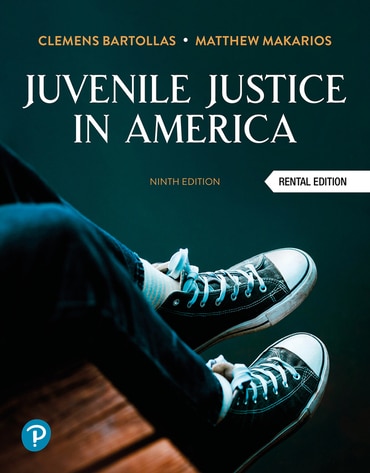
Juvenile Justice In America, 9th edition
- Clemens Bartollas |
- Matthew Makarios |
Title overview
For courses in juvenile justice, delinquency, criminal justice, criminology and social work.
An in-depth look at juvenile justice, from multiple viewpoints
Juvenile Justice in America looks at the lives of juveniles and their experiences in society. Balancing theory, evidence and practice, Bartollas and Makarios examine the policies and problems of US juvenile justice. They offer the fullest coverage of the history, data, legal issues, evidence-based programs and best practices of juvenile justice today.
The 9th Edition adds several new sections highlighting recent issues shaping juvenile justice policy, interventions and programming. All statistics have been updated and new boxes added to illustrate transformative challenges, from the COVID-19 pandemic to school victimization.
Hallmark features of this title
Perspectives within the juvenile justice system
- Evidence-Based Practice boxes highlight real examples of evidence-based practices and programs.
- Focus boxes scrutinize juvenile justice laws, social policy and intervention programs, while offering insights into offenders' thoughts and motivations.
- Thinking Like a Corrections Professional boxes help students consider how they might handle an issue or challenge in juvenile justice.
- Career boxes detail how practitioners in juvenile justice work effectively with youth offenders.
Active learning
- Critical-thinking and review questions appear at the end of chapters and certain boxes.
- Group exercises in each chapter include exercises for small group discussions, writing exercises and suggestions for class debate topics.
New and updated features of this title
New sections weighing practical realities of the juvenile justice system
- NEW: A new section on redemptive criminology (Ch. 1) examines how related practices play out in juvenile justice settings.
- NEW: A new section on mass shootings in schools (Ch. 2) considers the implications for juvenile justice interventions.
- NEW: A new section on LGBTQ youths in the juvenile justice system (Ch. 4) looks at the needs and experiences of this population of offenders.
Latest issues, data and research in the field
- NEW: Developments in juvenile justice interventions are explored in new sections on diversion and juvenile justice (Ch. 5), gangs and non-violence interventions (Ch. 5) and gun-based interventions: Operation Ceasefire (Ch. 6).
- NEW: Programming supporting youth offenders is explored in a new Focus on Community-Based Programming box: RECLAIM Ohio (Ch. 9), a new Section on Community Corrections Facilities for Juveniles in Ohio (Ch. 9) and new sections on juvenile reentry programs (Ch. 11).
- UPDATED: All statistics have been updated, including those on juvenile crime (Ch. 2), school victimization (Ch. 2) and juvenile institutions (Ch. 10).
Table of contents
- Juvenile Justice
- The Extent and Nature of Juvenile Crime
- Causes of Juvenile Crime
- Gender and Juvenile Justice
- The Prevention of Delinquency
- The Police
- The Juvenile Court
- Juveniles in Adult Court
- Community Corrections
- Juvenile Institutionalization
- Juvenile Aftercare
- Treatment Technologies
- Juvenile Gangs
- Drugs and Delinquency
- Juvenile Justice in the Twenty-First Century
Author bios
About our authors
Clemens Bartollas, PhD, is professor of sociology at the University of Northern Iowa. He holds a BA from Davis and Elkins College, a BD from Princeton Theological Seminary, an STM from San Francisco Theological Seminary and a PhD in sociology, with a special emphasis on criminology, from The Ohio State University. Dr. Bartollas taught at Pembroke State University from 1973 to 1975, at Sangamon State University from 1975 to 1980 and at the University of Northern Iowa from 1981 to the present. He has received honors at the University of Northern Iowa, including Distinguished Scholar, the Donald McKay Research Award and the Regents' Award for Faculty Excellence. Dr. Bartollas, like his coauthor, is also the author of numerous articles and more than 30 books, including previous editions of Juvenile Delinquency (Allyn & Bacon, 2006), Juvenile Justice in America (with Stuart J. Miller; Prentice Hall, 2011) and Women and the Criminal Justice System (with Katherine Stuart van Wormer; Prentice Hall, 2011).
Matthew Makarios, PhD, is an associate professor in the Department of Sociology, Anthropology and Criminology at the University of Northern Iowa. He received his BA in criminology from the University of Minnesota Duluth, his MA in criminal justice from Washington State University, and his PhD in criminal justice from the University of Cincinnati.